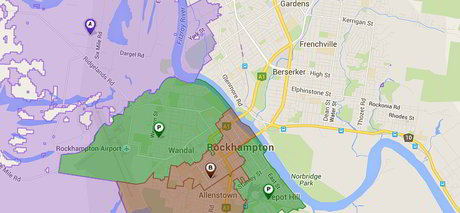Councils bypass NBN to build their own fibre futures

Routine roadworks on Quay Street, along the Fitzroy River in the 100,000-strong city of Rockhampton, Queensland, have commenced with one significant difference: when the road is eventually sealed, it will contain a fibre-optic backbone that local officials believe will leapfrog an anaemic national broadband network (NBN) capability to provide cutting-edge communications across the regional centre.
It's a bold strategy for the traditionally resource-constrained local government sector, but one that regional mayor Margaret Strelow has vigorously defended as part of a reinvigoration — funded with $2m of council funds and $15m of state development funding — of the city's CBD area.
Yet Strelow says the decision to lay fibre —– which will likely be leased to a not-for-profit telecommunications company that will wholesale internet services to local businesses — became inevitable after the Abbott and Turnbull government-funded NBN rollout ditched previous plans for ubiquitous fibre-to-the-premises (FTTP) services in favour of a combination of slower fibre to the node (FTTN) and fixed wireless services that will, as per current nbn plans, only cover less than half of Rockhampton.
nbn had quoted $1.3m to install an additional 12 km of fibre into the city.
“We've accepted that the fibre NBN isn't going to happen for us at the moment, so we're making it into an opportunity," Strelow told GTR. “You can complain and you can beg, but there's a point at which you've just got to get the best solution for your community that you can get."
The fibre backbone rollout — which will also include delivery of high-speed Wi-Fi services to local businesses — is one element of a 'smart city' upgrade intended to revitalise the CBD as a precinct for innovation and connected opportunities.
Rockhampton isn't the first city to consider going it alone in the wake of long delays in the NBN rollout. In 2010 Brisbane City Council, for one, famously kicked off and then canned a citywide fibre rollout to 500,000 homes through the sewers under the leadership of then-mayor Campbell Newman.
Strelow, however, says the Rockhampton fibre will be rolled out incrementally as the proposed telco is formalised — Rockhampton son and IT-industry dignitary Bevan Slattery is among those providing technical guidance for the project —– and that fibre will become business as usual for the council.
“Every time we have a ditch open, we will run some fibre," she said. “Our goal will be to do the fibre for ourselves in those areas that aren't likely to get the sort of capacity that we want."
Classification of fibre-optic backbones as a core infrastructure element is a bold step for local councils, which have in general waited for guidance from NBN when it comes to complex (and expensive) telecommunications upgrades.
However, as Rockhampton's initiative suggests, proactive telecoms policies are likely to offer additional benefits for local councils revisiting their physical infrastructure and long-term planning.
That planning is likely to increasingly take precedence in the wake of a recent audit of roads and community infrastructure, the Australian Local Government Association (ALGA) State of the Assets Report 2015, which highlighted a widening gulf between infrastructure requirements and infrastructure capabilities moving forward.
That audit found that 11% of Australia's infrastructure — worth $47 billion — is in poor condition and needs renewal or upgrade. Some 7% of national infrastructure was rated poor, and an additional 25% rated as 'fair', in terms of providing functions to meet program delivery needs with similar proportions noted in the physical infrastructure's ability to meet service needs.
Given that recommendations by the auditors included “improving transport and communication networks to plan optimum strategies for 'farm gate/factory to market' and support services such as tourism and technology exports" — a nod towards the need to deliver better broadband to and across local government areas — the piggybacking of fibre-optic infrastructure on top of physical infrastructure refreshes could well prove to be an increasingly appealing approach in regions that, as in Rockhampton, are still waiting for the broadband necessary to kick-start their economies.
After years of false starts, recent signs suggest that the idea is catching on to some degree in other areas, with Adelaide lord mayor Martin Haese recently pushing to roll out Wi-Fi “in every single council area and on every main street".
Infrastructure access is not only seen as a driver for economic growth, but as a facilitator for council efficiencies: an NBN trial in Townsville, Queensland, for example, was previously recognised with an innovation award for its work in smart water metering and usage.
Such early projects have pointed the way towards even bigger benefits from broad-based rollouts in the future — and Strelow is determined to put Rockhampton at the vanguard, one street at a time.
“I don't think anyone is exaggerating when they talk about [broadband] as the next industrial revolution," said Strelow, who warns that a lack of action in the CBD will disadvantage businesses and residents in those areas as against those in new developments where fibre is being rolled out by default.
“It's not something we can afford to sit back for the next couple of years and wait for the policy to catch up. We are already challenged."
From principles to practice: OECD E‑Leaders 2025 in Sydney and the road to Government 3.0
Why the E‑Leaders moment matters — right now: moving towards Government 3.0.
Keeping pace with APAC's digital ambition
Australian governments need to be careful not to fall behind in the APAC digital race.
Why care is the key for public sector leaders to build better engagement
Today's public sector leaders are facing increasing complex challenges such as burnout,...




